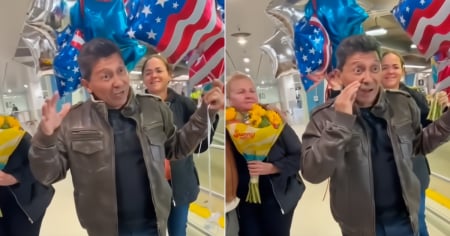Miguel Díaz-Canel arrived in Caracas on the morning of this Friday to attend the new power takeover of Nicolás Maduro, in a swearing-in ceremony scheduled for January 10.
"Here we are in #Venezuela, homeland of the brave people of Simón Bolívar, Hugo Chávez, and Nicolás Maduro. We come to stand by, at the moment of his swearing-in, the legitimate President of this country, which is the cradle of independence in Our America. Here is #Cuba, brother Nicolás," can be read on the governing leader's account on X.
Díaz-Canel, who interestingly arrived in Caracas without Lis Cuesta, was received at the “Simón Bolívar” International Airport in Maiquetía, shortly after eight in the morning (local time).
At the foot of the aircraft's stairs, he was greeted by Gabriela Jiménez, Vice President of Science, Technology, Education, and Health for Venezuela, along with Dagoberto Rodríguez, ambassador of Cuba to the South American nation.
Díaz-Canel traveled alongside the Cuban Foreign Minister, Bruno Rodríguez, and other senior officials. At the airport terminal, a guard welcomed the leader with military honors.
This is the seventh time Díaz-Canel has visited Venezuela since assuming the presidency.
The Presidency of Cuba did not miss the opportunity to emphasize that the Cuban ruler came to attend the swearing-in ceremony of the "legitimately reelected president by the Venezuelan people on July 28", a viewpoint that does not align with millions of Venezuelans and a significant portion of the international community.
Although the oficialista press in Venezuela has emphasized that "more than 2,000 representatives from governments, social movements from over a hundred countries across all continents, and international organizations traveled to this capital to attend Maduro's swearing-in ceremony this Friday at the Federal Legislative Palace," the reality is that the representation of presidents will be almost nonexistent.
Miguel Díaz-Canel is one of the few presidents expected to attend the controversial event, which represents Maduro's third consecutive term, allegedly keeping him in power until 2031, despite the fact that the elections were won by opposition candidate Edmundo González.
A great uncertainty looms over today's swearing-in, following the protests that began this Thursday across much of the country.
On the other hand, Edmundo González warned that he plans to arrive in Venezuela this Friday to take office as the elected president.
This Thursday, the Venezuelan opposition leader María Corina Machado emerged from hiding to participate in a rally in Caracas.
However, as she was leaving the event, Machado was abducted by forces affiliated with Nicolás Maduro's chavista regime and released shortly after.
Frequently asked questions about Díaz-Canel's visit to Venezuela and the political situation in both countries
Why did Miguel Díaz-Canel visit Venezuela in January 2025?
Miguel Díaz-Canel visited Venezuela to attend Nicolás Maduro's inauguration ceremony, amid a backdrop of increasing political instability in the South American country. This visit reinforced the Cuban regime's support for Maduro's government, despite allegations of electoral fraud and opposition protests.
What has the relationship between Cuba and Venezuela been like in recent years?
The relationship between Cuba and Venezuela has historically been close, based on mutual ideological and political support. Cuba has been one of Venezuela's main allies, backing Maduro's government despite international criticism and allegations of electoral fraud. This alliance has been crucial for the economic survival of the Cuban regime.
What does Nicolás Maduro's third term mean for Venezuela?
The third term of Nicolás Maduro, implies a continuation in power until 2031, despite the controversial elections and allegations of fraud from the opposition and the international community. This situation has sparked protests and significant political uncertainty in the country.
What reactions has Cuba's support for Maduro generated?
Cuba's support for Maduro has generated both internal and international criticism. The Cuban regime is one of the few that recognizes Maduro's victory, which has been questioned by the international community and by millions of Venezuelans who do not consider the elections legitimate. This stance has fueled political tensions in the region.
Filed under:
